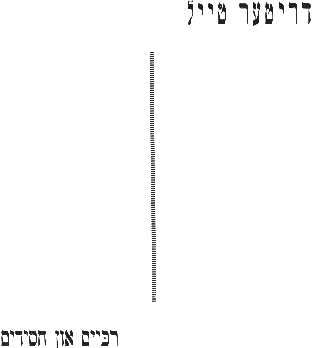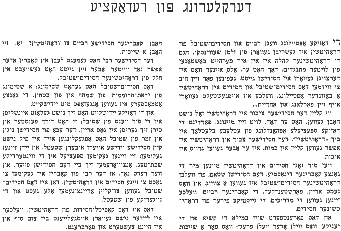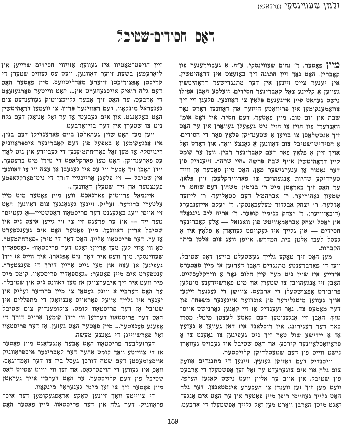Previous Page
|
Next Page

[Page 157]
PART THREE
REBBES AND CHASSIDIM

[Page 158 – unnumbered]
STATEMENT BY THE EDITORIAL BOARD
This section about rebbes and chassidim in Drohitchin was written by Zalman Shevinsky. Although the Drohitchin community was mainly composed of non-chassidim, as a person raised in the chassidic spirit, Shevinsky felt obligated to dedicate a special section to the chassidic synagogue [shtibel] and chassidim of Drohitchin. The special section is at his request and responsibility.
However small the chassidic community in Drohitchin was, in Shevinsky's opinion, this special section deserves a few pages in the Drohitchin Yizkor Book. The chassidic community in Drohitchin was small, but important in terms of quality.
When we use the term chassidim in reference to Drohitchin, we are referring to the Kobriner chassidic dynasty, of which the Drohitchin chassidic synagogue was a branch. The Drohitchin community, of course, followed the Kobrin rebbes, who were the guides and spiritual leaders of Drohitchin chassidim.
This answers the question of those who wonder what the connection is between Kobrin rebbes and Drohitchin. There is a connection. The chassidic rebbe may have lived in Kobrin or perhaps further away, but his spirit hovered over the Drohitchin shtibel. The shtibel in Drohitchin exuded an exalted fear of G-d, joy and trust in G-d. The entire atmosphere was saturated with Jewishness, which wasn't confined to the four walls of the shtibel itself.
Through the doors and windows it flowed onto the street. The echo of chassidic melodies also reverberated in the ears of non-chassidim in town. Jews would come to the shtibel, especially on the winter Sabbaths, to warm themselves by the chassidic fire. Whenever anyone announced that the Kobriner Rebbe was coming to visit his followers in Drohitchin, the shtibel didn't have enough room to hold all the out-of-towners and curiosity seekers.
This is the chassidic chapter in Drohitchin that never ended, and today is destroyed.
Zalman Shevinsky (Chicago)
 THE CHASSIDIC SHTIBEL
THE CHASSIDIC SHTIBEL
My father, R. Nachum Shevinsky, was born in Kobrin and settled in Drohitchin after his marriage. In those days in Drohitchin there was a small number of Kobriner chassidim, and they didn't even have their own place to pray. They would gather together in private homes for services on the holydays and Sabbath. My father, a chassid, didn't like go to different homes each time, and decided to build a permanent shtibel for the chassidim so they would have their own place to pray all week long, as well as a location to host the Kobriner Rebbe on his Sabbath visits to Drohitchin. Since my father was an energetic individual, he started making his plans a reality. He met with R. Binyamin Moshe, the ritual slaughterer, R. Shimon Nahorier, R. Avrahamel, the cabinet maker, R. Leizer Adler, R. Yitzchak Avigdor Telekhansky, R. Yaakov Eisenberg (Doboviyer), R. Yitzchak Binyamin Cooper, R. Aryeh Leib Gingold and Yossel Yitzchak Abramovich from the train station. They were all Kobriner chassidim, and they purchased a place in an alley near the Old House of Study on the road to the Old Cemetery.
Construction of the shtibel began quickly. When the devoted non-chassidim saw that my father's idea was no longer merely a dream but a reality, they started making various efforts to interfere with the work. Among these opponents were members of our own family on my mother's side. However, when they saw they couldn't stop the project, they resorted to their ultimate weapon: informing the government. In Russia in those days there was a law that said that no synagogue could be built too close to a church, and the shtibel was being built not far from the town church.
The non-chassidim, knowing about that law, went to the priest to ask him to stop the construction of the shtibel. They said that if he couldn't help them, they wanted him to go to higher authorities on their behalf. The priest immediately called my father to meet with him, and ordered my father to stop construction. The reason the priest gave my father was the problem that the chassidim shouted and made noise during their prayers, something which would disturb the Christian services. My father calmed the priest, and proceeded to continue with the construction. However, he approached General Minkov, the Rovno nobleman to whom Drohitchin belonged, and asked him to tell the priest not to interfere with the construction work.
Near the end of construction, a decree arrived from Kobrin district police officer Rineyski to seal up the building and cease construction. The doors were covered with wood, but the chassidim found a way to pray in the shtibel anyway – by sneaking in through the open windows.
One Friday night, when my father and my elder brother Zelig went to pray, they met the local policeman, Rothstein, who had converted to Christianity. He asked them whether they were going to the shtibel. My father responded that it was Rothstein himself who had sealed up the doors, so how could they go inside? The policeman responded, “Mr. Shevinsky, you can't fool me. I know that Jews figured out how to get in, and they are sneaking in through the windows.” My father said, “Mr. Policeman, come with me and see that no one is praying in the shtibel.” Father winked at my brother quickly ran off to the shtibel to tell the people there that the policeman was on his way. When he arrived at the shtibel, the policeman noticed the Jews leaving through the open windows. My father made sure that the policeman kept silent about it.
The same policeman told my father that the following week, the district police official from Kobrin would be arriving in town to measure the area through the alley right up to Sand Street, which was the main street in town, to determine how far the synagogue was from the church. He also advised my father to talk with General Minkov.
Previous Page
|
Next Page
This material is made available by JewishGen, Inc.
and the Yizkor Book Project for the purpose of
fulfilling our
mission of disseminating information about the Holocaust and
destroyed Jewish communities.
This material may not be copied,
sold or bartered without JewishGen, Inc.'s permission. Rights may be
reserved by the copyright holder.
JewishGen, Inc. makes no representations regarding the accuracy of
the translation. The reader may wish to refer to the original material
for verification.
JewishGen is not responsible for inaccuracies or omissions in the original work and cannot rewrite or edit the text to correct inaccuracies and/or omissions.
Our mission is to produce a translation of the original work and we cannot verify the accuracy of statements or alter facts cited.
 Drogichin, Belarus
Drogichin, Belarus
 Yizkor Book Project
Yizkor Book Project
 JewishGen Home Page
JewishGen Home Page
Yizkor Book Director, Lance Ackerfeld
This web page created by Lance Ackerfeld
Copyright © 1999-2026 by JewishGen, Inc.
Updated 5 July 2002 by LA



 Drogichin, Belarus
Drogichin, Belarus
 Yizkor Book Project
Yizkor Book Project
 JewishGen Home Page
JewishGen Home Page